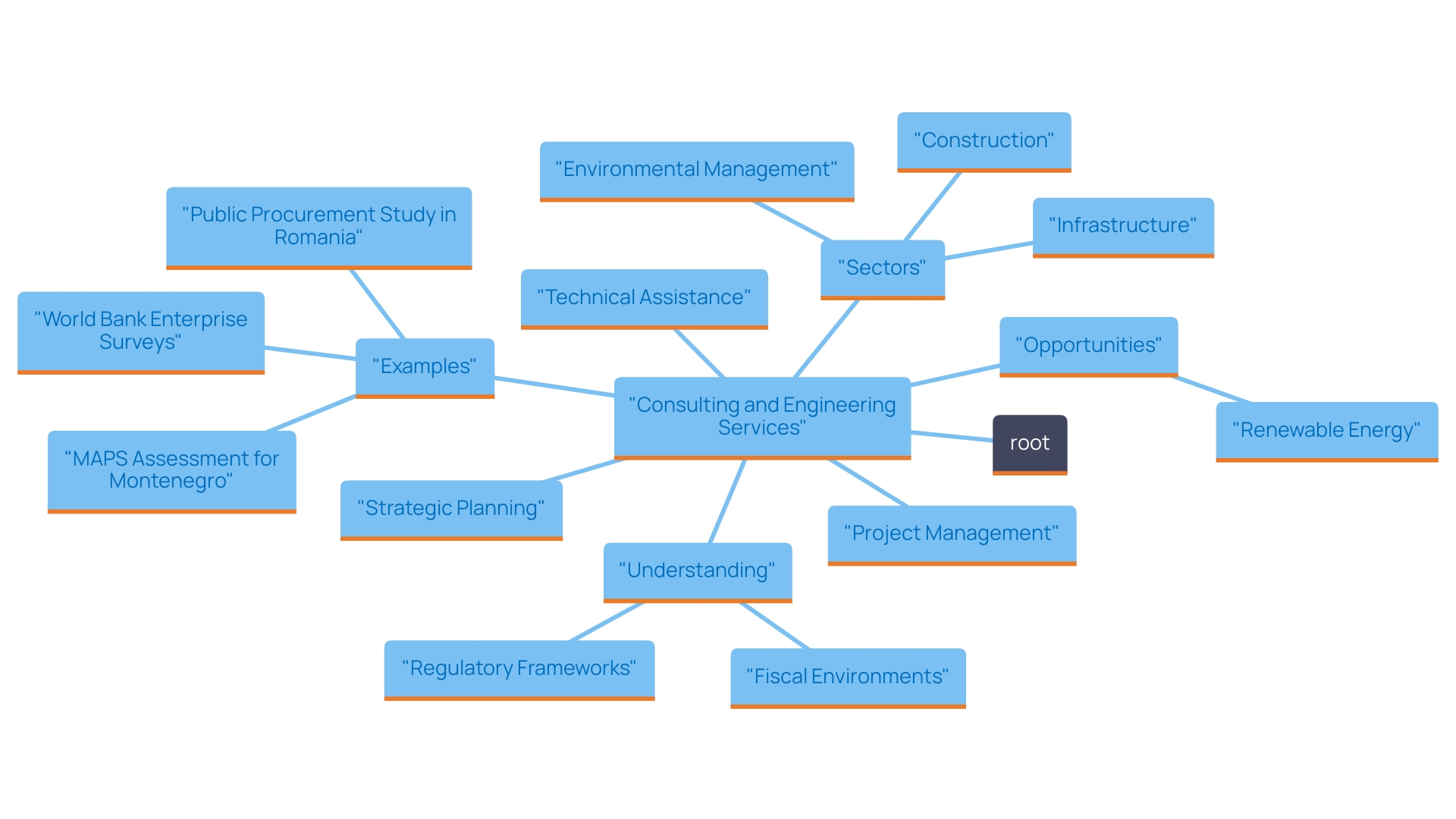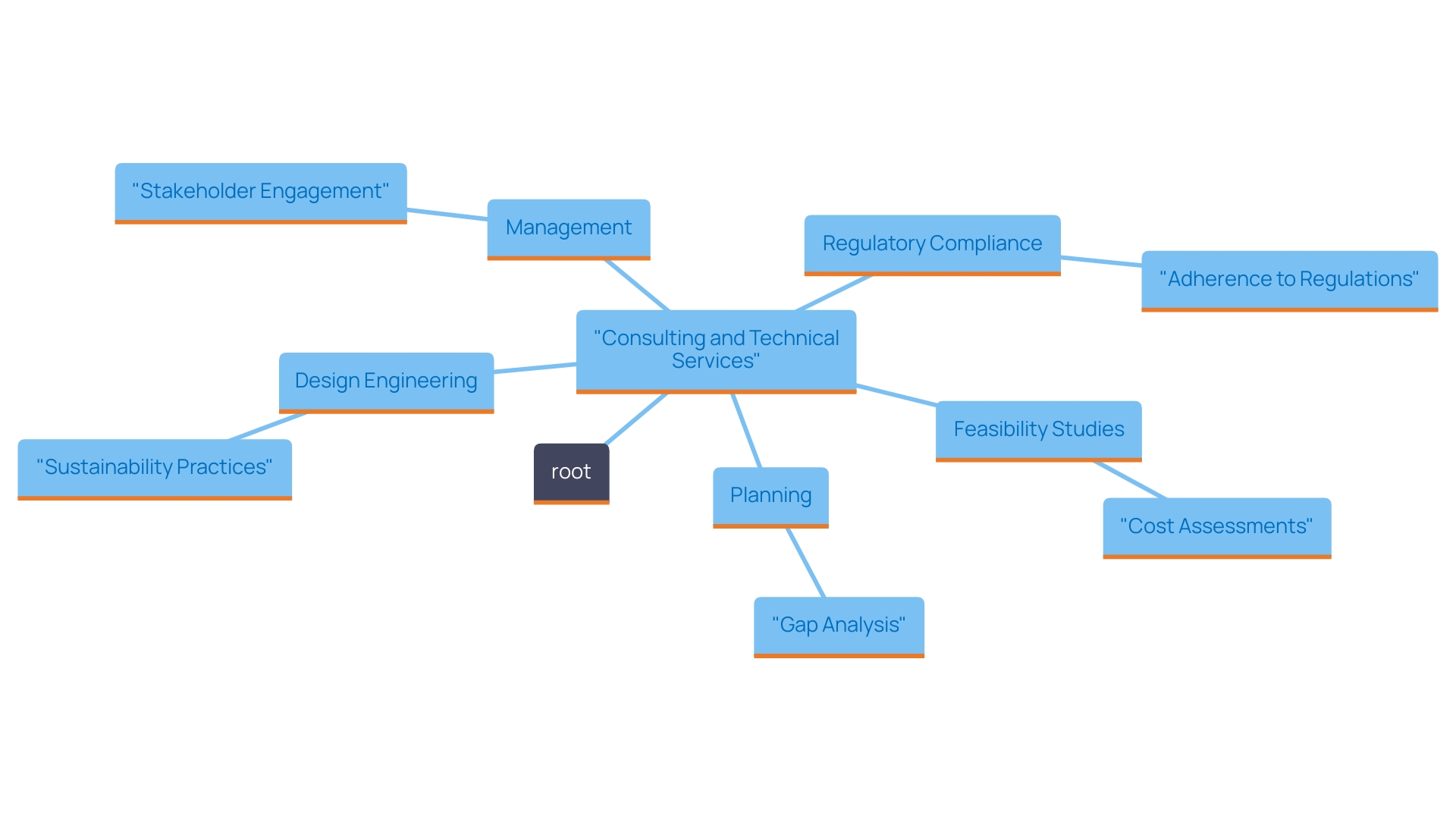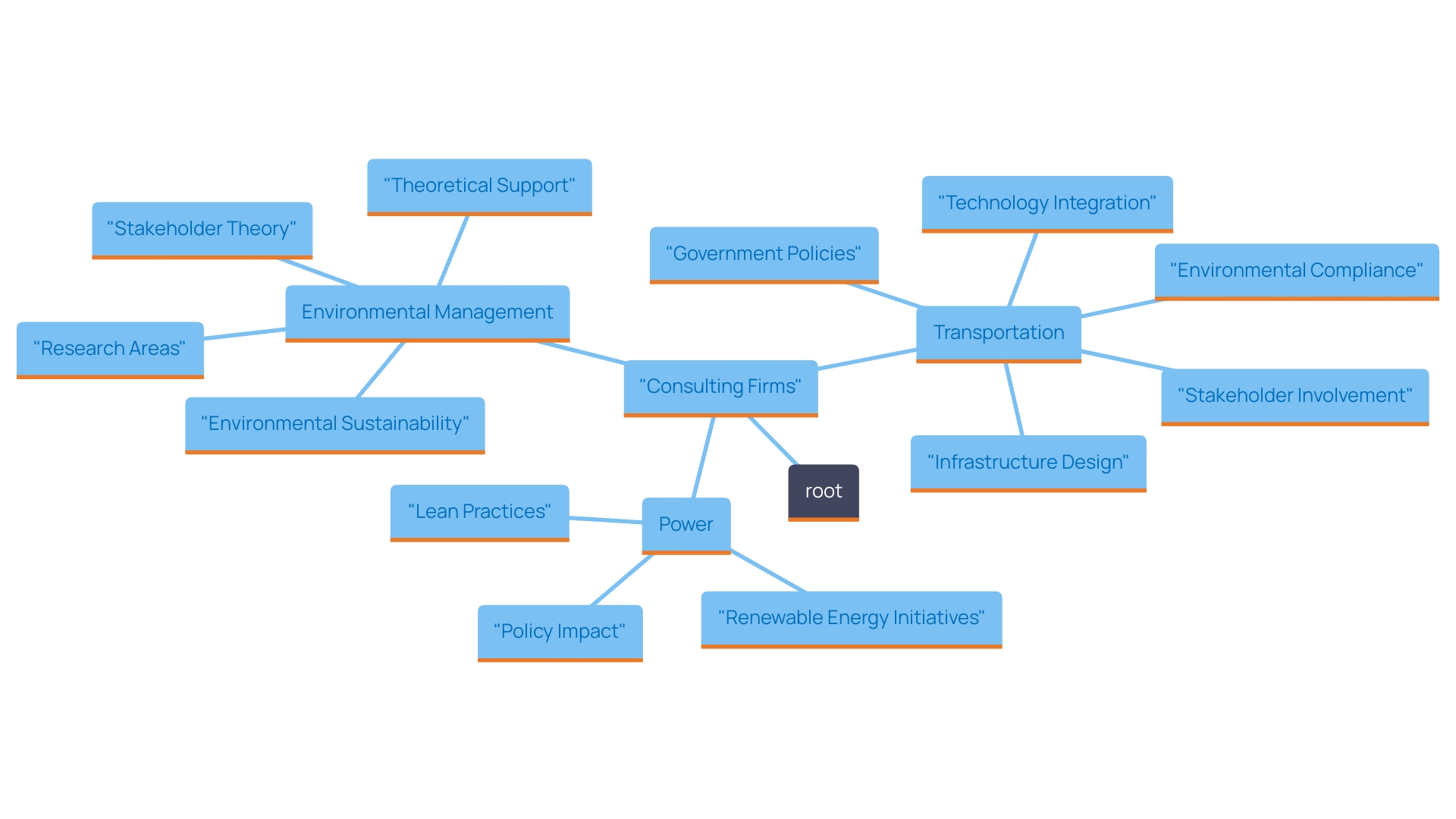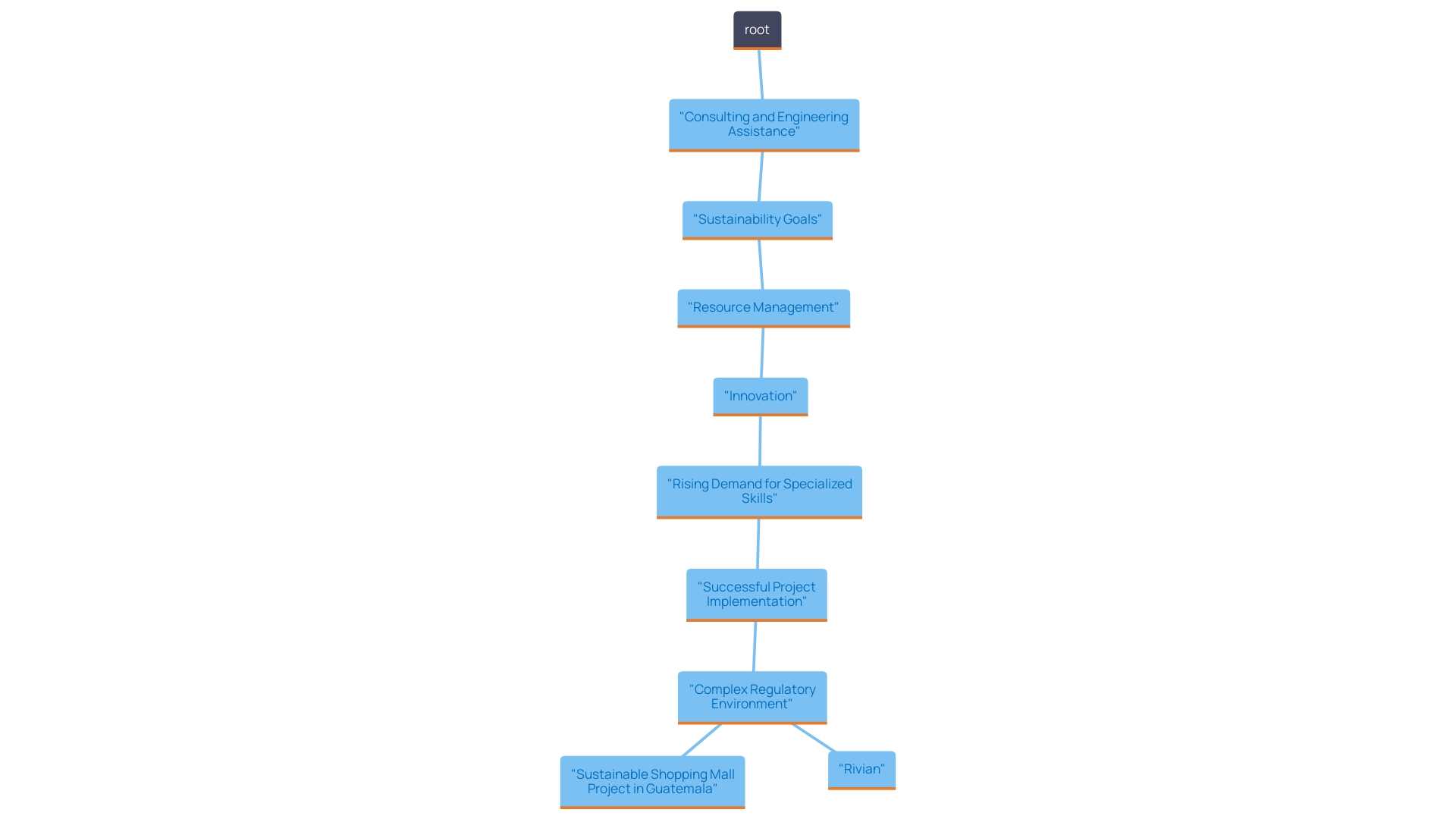Introduction
In an era defined by rapid technological advancements and increasing regulatory complexities, consulting and engineering services emerge as essential allies for organizations navigating multifaceted projects. These services extend beyond mere guidance; they encompass a comprehensive range of offerings, from project management to strategic planning, tailored to meet the unique demands of diverse industries such as energy, construction, and environmental management. As firms leverage extensive expertise across multiple sectors, they empower clients to not only achieve immediate project goals but also to strategically position themselves for future challenges.
This article delves into the critical components, applications, and overarching importance of consulting and engineering services, illustrating how they serve as catalysts for innovation and sustainability in a constantly evolving landscape.
Definition of Consulting and Engineering Services
Consulting and engineering support play an essential role in assisting organizations through the intricacies of planning, designing, and executing a broad range of initiatives across various sectors. These solutions are not merely about providing expert advice; they encompass a comprehensive suite of professional offerings including technical assistance, project management, and strategic planning tailored to meet the unique needs of each client. Sectors such as infrastructure, environmental management, and construction heavily rely on these services to navigate stringent regulatory frameworks and industry standards.
The strength of consulting and engineering firms lies in their ability to synthesize knowledge from over 100 technical disciplines, allowing for innovative solutions to technically complex challenges. For instance, recent initiatives carried out in areas such as the Middle East and Africa included the expansion and enhancement of electricity networks, demonstrating the incorporation of sophisticated management systems that are crucial for dependable power distribution.
Furthermore, as the worldwide power landscape transforms, consulting firms are adjusting to tackle new opportunities, such as those connected to renewable resource investments. Comprehending the fiscal environment is crucial; for example, developers in Madagascar can gain from customs exemptions and tax reductions when investing in renewable energy initiatives. Staying informed about the latest changes in tax regulations is crucial for maximizing these benefits.
Ultimately, the main aim of consulting and technical assistance is to enable clients to reach their goals effectively, while ensuring adherence to all relevant regulations. With the right collaboration, organizations can not only meet their immediate needs but also position themselves strategically for future developments in an ever-changing market.

Components of Consulting and Engineering Services
Consulting and technical services encompass several crucial components, each essential to the successful execution of infrastructure initiatives. These components include thorough planning, comprehensive feasibility studies, precise design engineering, effective management, and stringent regulatory compliance.
Planning is the foundational step, where the scope and requirements of an initiative are meticulously assessed. This phase often involves conducting a gap analysis to identify any discrepancies between current work instructions and regulatory requirements, particularly in the context of UK operations. Such analysis is essential for ensuring that all aspects align with legal standards and operational needs.
Feasibility studies follow, evaluating the initiative's viability through detailed assessments of cost implications and resource availability. This analysis extends to potential modes of failure, as seen in case studies where teams collaborated with clients to develop strategic action plans that mitigate risks effectively. For instance, an initiative with United Utilities resulted in a successful cost adjustment claim to the U.K. Water Services Regulation Authority by utilizing insights gained from failure likelihood assessments.
Design engineering plays a pivotal role in transforming concepts into tangible plans. This involves creating technical specifications that not only meet objectives but also adhere to sustainability practices, minimizing environmental impacts. As the industry shifts towards a more regenerative approach, engineers are increasingly focused on long-term operational efficiencies and compliance with evolving sustainability standards.
Management guarantees that initiatives are completed on schedule and within financial limits. This includes regular stakeholder engagement and collaboration with various experts, such as equipment specialists and regulatory authorities, to navigate complex compliance landscapes. Effective management also involves adapting to changing dynamics and industry trends, particularly in light of new funding opportunities and regulatory shifts stemming from legislation like the Infrastructure Investment and Jobs Act.
Lastly, regulatory compliance cannot be overlooked. It ensures that initiatives meet local, state, and federal regulations, a critical factor that can influence timelines and costs. As the landscape of civil engineering evolves, with a growing emphasis on sustainability and collaborative approaches, the ability to navigate these regulatory frameworks becomes increasingly vital for the success of engineering endeavors.

Applications and Sectors of Consulting and Engineering Services
Advisory assistance plays a crucial role across various sectors, including transportation, water resources, construction, and environmental management, by utilizing extensive expertise to address complex challenges. In the transportation field, consulting firms play a crucial role in the design and execution of advanced transportation systems and infrastructure initiatives such as roads, bridges, and public transit networks. Their contributions ensure that these systems not only meet current demands but are also adaptable for future growth and sustainability.
In the power sector, consulting services offer essential insights and guidance on a range of projects, from renewable initiatives to oil and gas operations and utility management. With a growing emphasis on sustainable practices, firms are increasingly focusing on innovative solutions that align with global transition goals. For instance, recent investments in renewable technologies underscore the shift towards cleaner energy sources, highlighting the importance of expert consultation in navigating this evolving landscape.
Environmental consulting is another vital area, concentrating on assessing environmental impacts and ensuring compliance with regulatory frameworks. This aspect is crucial for facilitating sustainable development, as it helps organizations understand and mitigate their ecological footprints while adhering to strict environmental laws. By employing rigorous methodologies and up-to-date data, environmental consultants guide businesses in making informed decisions that align with both economic and ecological objectives.
As industries face unprecedented challenges, including the need for resilient supply chains and the integration of smart technologies, consulting firms are positioned at the forefront, utilizing innovative approaches to drive efficiency and sustainability. The intersection of technological advancement and expert consultation is essential in redefining operational strategies and fostering long-term growth across all sectors.

The Importance of Consulting and Engineering Services
Consulting and engineering assistance are essential for the successful implementation of initiatives across various sectors, particularly in today's rapidly changing environment. These solutions allow organizations to navigate the intricacies of complex regulatory environments while optimizing resource allocation and effectively mitigating risks. By harnessing the expertise of seasoned professionals, clients can enhance project efficiency, achieve significant cost reductions, and ensure high-quality outcomes. For example, Rivian, an electric vehicle manufacturer, exemplifies how expert guidance is essential for achieving ambitious sustainability goals, such as their commitment to net-zero emissions by 2040. Their efforts require innovative methods for resource management and production processes, highlighting the essential role that engineering support plays in aligning business objectives with environmental stewardship.
Furthermore, these services serve as a catalyst for innovation by integrating advanced technologies and methodologies. This is evident in projects like the sustainable shopping mall being developed in Guatemala, which aims for Energy Net Zero while blending modern design with traditional architecture. Such initiatives demonstrate how consulting and technical expertise fosters creative solutions that not only meet client needs but also contribute to broader sustainability goals.
As industries increasingly prioritize sustainability, the demand for specialized skills within the technical sector is on the rise. Recent surveys indicate that over 75% of organizations report a need for enhanced skills to implement their sustainability strategies effectively. This underscores the necessity for continuous professional development in consulting sectors to equip teams with the knowledge required to tackle emerging challenges. The ongoing innovations in engineering practices, alongside strategic partnerships, are vital for navigating the complexities of modern projects and ensuring long-term success.

Conclusion
Consulting and engineering services are vital components in the successful navigation of today's complex project landscapes. By providing a comprehensive suite of offerings—ranging from project planning and feasibility studies to design engineering and regulatory compliance—these services empower organizations to optimize their operations and mitigate risks effectively. The integration of expertise from various sectors ensures that projects not only meet immediate goals but also align with long-term sustainability objectives.
The application of consulting and engineering services spans multiple industries, including transportation, energy, and environmental management. These sectors benefit significantly from innovative solutions that address both current demands and future challenges. The emphasis on sustainability and compliance with evolving regulations underscores the necessity of these services in fostering responsible development and operational efficiency.
Ultimately, the role of consulting and engineering services extends beyond mere guidance; they are catalysts for innovation and sustainability. As organizations increasingly prioritize environmental stewardship and resilience, the demand for specialized expertise continues to grow. Investing in these services not only enhances project outcomes but also positions firms to thrive in an ever-evolving landscape, reinforcing the importance of strategic partnerships in achieving success.




